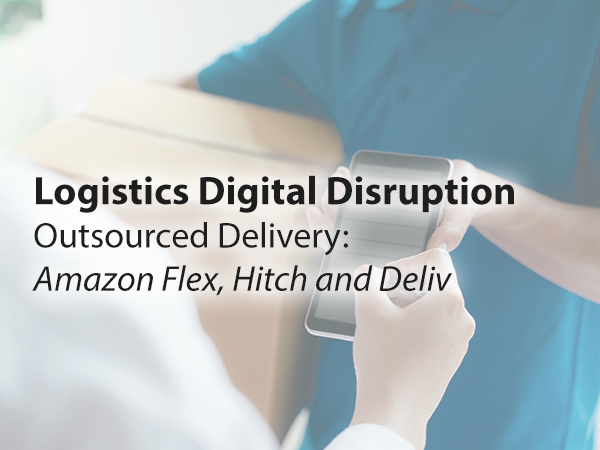Continuing our series about logistics digital disruption, in this post we examine the impact of outsourced last-mile delivery models on the logistics industry. Amazon Flex, Hitch and Deliv are all last-mile outsourced delivery services. Their models are disrupting the logistics economy and forcing operators and distributors to rethink how they might compete.
What is Amazon Flex?
Amazon Flex is a flexible way for people to earn extra cash. Whether already a delivery driver, or just an ordinary member of the public, signing up to Amazon Flex gives people a £12-15 an hour income that can be earned in their spare time – as “gig work”.
With access to a car and an Android or iOS smartphone, Delivery Partners work for Amazon as self-employed contractors, so are responsible for their own tax and National Insurance.
There is no guarantee that delivery blocks will be available to suit, and specific delivery areas cannot be chosen, so it’s not an assured career – just an ad hoc, informal undertaking. Blocks come in durations of one to four hours and drivers can schedule for that day or for upcoming days.
Amazon’s Flex app shows drivers which packages they need to deliver, and to where, along with a suggested delivery route.
What is Hitch?
Hitch is a US service. It was set up before Amazon Flex – in 2014 – and operates in a much more crowdsourced way, matching deliveries with people already travelling in the same direction as the parcel’s intended destination.
With Hitch, it is the consumers placing the orders that are matched up – not the distributors. So it’s great for delivering already purchased gifts or distributing business documents and items without hiring a courier.
Also, deliverers – what Hitch calls “Travelers” – can only select one item at a time to be delivered, so it’s not a fully outsourced delivery opportunity for the drivers in the same way that Amazon Flex is.
The Hitch app is available on Android and iOS, and offers GPS route creation and tracking. Payments in and out are made via Stripe.
What is Deliv?
Deliv is also a precursor to Amazon Flex, having been launched in 2012. It offers last-mile, same-day delivery services to retail businesses in a select number of US cities.
Rather than offering ad hoc deliveries, Deliv’s model is more one of partnership. It aims to be the chosen last-mile supplier for retailers and omnichannel businesses, seeking long-term business-to-business partnerships. Its customers include Adidas, Pandora, Sony, Walgreens and Best Buy.
The company splits its business into a number of areas. Deliv Small Business and Deliv Enterprise are aimed – as their names suggest – towards size of company. But there is also Deliv Fresh, which transports groceries, and Deliv Rx for medical and pharmaceutical deliveries.
How last-mile outsourced delivery will impact logistics
When consumers want same-day and next-day delivery, outsourcing the “last-mile” element may be the only option for companies looking to both keep costs to a minimum and to not pass on the inevitable cost implications to their customers.
To meet customer expectations, retailers and distributors are looking to get orders to their customers ever faster. And it’s here that last-mile delivery makes the difference. Accepted as the costliest and most time-consuming part of the fulfilment process, any way last-mile deliveries can be speeded up or carried out at reduced costs will help.
When emerging digital technologies and retail outlets come together like they do with outsourced delivery, it only serves to empower the retail industry and its customers. This makes products easier, faster and cheaper to get hold of. To compete with Amazon’s speedy deliveries, distributors will need to access these sorts of crowdsourced and outsourced delivery services in order to compete. It’s likely only a matter of time, therefore, before we see the likes of Hitch and Deliv in the UK.
